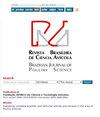冷链对鸡蛋品质的影响在模拟洗后加工和消费者储存模型中
IF 1.1
4区 农林科学
Q3 AGRICULTURE, DAIRY & ANIMAL SCIENCE
引用次数: 0
摘要
本文章由计算机程序翻译,如有差异,请以英文原文为准。
Effect of Cold Chain on Chicken Egg Quality in a Simulated Post Washing Processing and Consumer Storage Model
This study assessed the effect of the cold chain on egg quality in a model simulation of post-washing processing and consumer storage. Post-washed eggs were assigned to 12 groups that simulated the conditions of temporary storage after washing (step 1; 7°C or 25°C for 1 day), transportation (step 2; 7°C or 30°C for 8 h), and selling or storage (step 3; 7°C, 25°C or 30°C for 4 weeks). The freshness and microbial characteristics of the eggs were analyzed for 4 weeks. High-temperature conditions in steps 1 or 2 resulted in reduced quality and more bacteria on eggshells, and this egg quality deterioration worsened after storage for over 2 weeks. In step 3, the quality of the eggs stored at 7°C was maintained during the entire storage, whereas the eggs stored at 25°C had lower quality and broken vitelline membranes in week 4, and the eggs stored at 30°C were spoiled. Eggs should be stored from post-washing until storage by consumers in a cold environment without interruption of temperature control to maintain quality and safety. Consumers must be aware that eggs should be stored at refrigerator temperature
求助全文
通过发布文献求助,成功后即可免费获取论文全文。
去求助
来源期刊

Brazilian Journal of Poultry Science
农林科学-奶制品与动物科学
CiteScore
1.80
自引率
9.10%
发文量
60
审稿时长
>12 weeks
期刊介绍:
A Revista Brasileira de Ciência Avícola surgiu em 1999 a partir da necessidade que a comunidade científica possuía de um periódico para veiculação e publicação de seus trabalhos, com a publicação de três números anuais.
A Revista conta hoje com um corpo editorial altamente qualificado e com artigos científicos desenvolvidos pelos maiores especialistas da área, o que a cada dia atrai mais leitores em busca de inovação e respaldo técnico.
Devido à credibilidade que conquistou pelos esforços de sus autores, relatores e revisores, a Revista ganhou caráter de coleção, sendo consultada como fonte segura de estudo desenvolvidos na Avicultura.
A partir de 2003 – volume 5 -, a Revista passou a chamar-se Brazilian Journal of Poultry Science, e todos os trabalhos passaram a ser publicados em inglês. No mesmo ano subiu para quatro o número de revistas por volume, ampliando-se assim os trabalhos publicados anualmente.
 求助内容:
求助内容: 应助结果提醒方式:
应助结果提醒方式:


